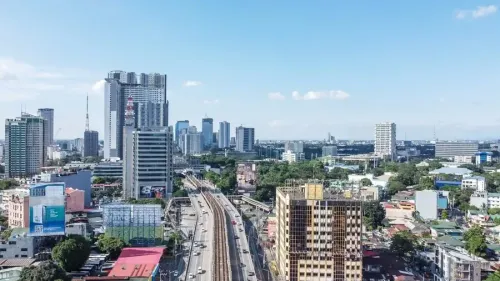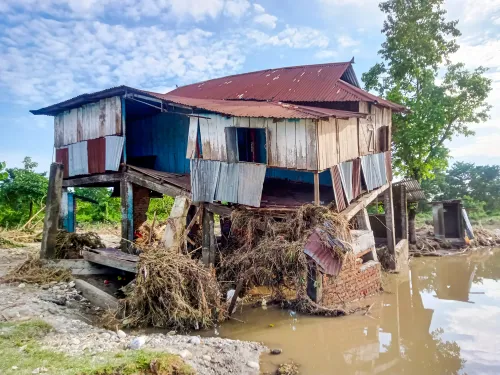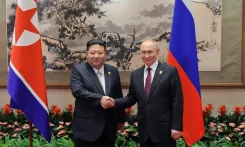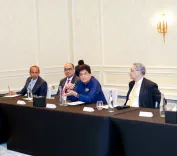Why Did Half of the MP Assembly Session Get Wiped Out Due to Protests?
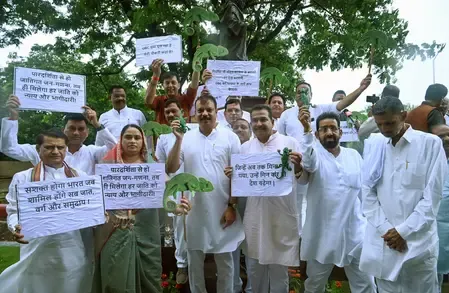
Synopsis
Key Takeaways
- Protests dominated the first five days of the monsoon session.
- Key legislation was passed despite disruptions.
- Opposition raised significant issues regarding safety and reservation policies.
- The session is scheduled to conclude on August 8.
- Speaker Narendra Singh Tomar emphasized the need for direct answers from the government.
Bhopal, Aug 1 (NationPress) The initial five days of the current monsoon session of the Madhya Pradesh Legislative Assembly have been marked by significant protests from the opposition (Congress) members, persistent disruptions, and some legislative activities, including the passage of vital bills until Friday.
Prior to the start of the monsoon session on July 28, the Madhya Pradesh Assembly Secretariat issued a notification banning protests and slogans within the Assembly grounds; however, these orders were largely ignored as opposition members continued their symbolic protests up to Friday.
On the opening day (July 28), the House was adjourned just two hours after it began, following tributes paid to the victims of the June 12 Ahmedabad plane crash, the April 22 Pahalgam terror attack, and other notable figures who have recently passed away.
On day two (July 29), the Leader of the Opposition, Umang Singhar, accused the state of failing to protect MLAs from assaults occurring statewide. He claimed that the state government and police were inactive regarding the accused. Additionally, Congress raised concerns about the reservation policy, asserting that the BJP government is reluctant to implement the 27 percent reservation for OBCs.
During the same day, Assembly Speaker Narendra Singh Tomar expressed frustration that legislators' questions were not being adequately addressed. He instructed Chief Minister Mohan Yadav to ensure direct responses instead of the vague replies stating that 'details are being gathered.' This issue was highlighted by senior Congress MLA Bala Bachchan from Jabalpur East, who noted that 16 inquiries related to the Chief Minister's office received the same response.
The Speaker responded, saying, 'Previous instructions have been issued regarding this. The Chief Minister is present; a direct answer should be forthcoming.'
On day three (July 30), proceedings began with a symbolic protest from the Opposition. Nevertheless, the House engaged in productive discussions on various significant issues raised by both Congress and BJP MLAs. Several key bills (Amendments) were approved.
On the fourth day (July 31), the Assembly ratified the revised rules of the Labour (Amendment) Bill 2025. These amendments require industrial units to provide a 45-day notice before declaring a strike or lockout. Despite protests from Congress MLAs, Labour Minister Prahlad Patel defended the bill, stating it aims to strike a balance between worker welfare and industrial advancement.
'We respect laborers, but we must also maintain our pace of development,' Patel asserted. During the House's proceedings, Urban Affairs Minister Kailash Vijayvargiya proposed discussions on expanding Metro rail connectivity. Senior Congress MLA and former Chief Minister Kamal Nath praised the proposal while also claiming credit for sanctioning the Rail Metro Project during his tenure as a Union Minister.
On the fifth day (August 1), chaos erupted in the Madhya Pradesh Assembly as opposition MLAs aggressively demanded the resignation of Cabinet Minister Vijay Shah.
The House was filled with chants of 'Vijay Shah resign' as soon as the minister began to address a departmental question. The relentless uproar led Speaker Narendra Singh Tomar to adjourn the House for 30 minutes. Upon reassembly, the opposition once again caused disorder. Amid the discussion of the second calling attention motion, the opposition members stormed into the Well. Consequently, the Speaker adjourned the House until August 4.
The monsoon session of the Madhya Pradesh Assembly is scheduled to conclude on August 8.



